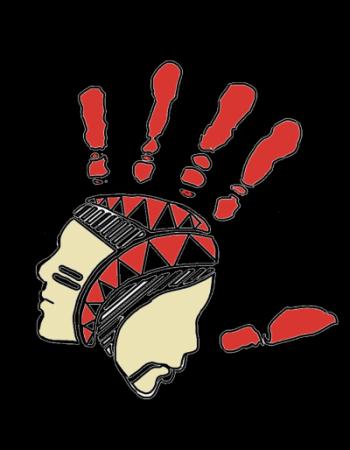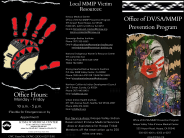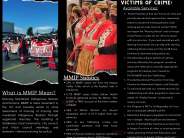MMIW and DV/SA
Missing and Murdered Indigenous Women (MMIW)
There is widespread anger and sadness in First Nations communities. Sisters, wives, mothers, and daughters are gone from their families without clear answers. There are families whose loved ones are missing—babies growing up without mothers, mothers without daughters, and grandmothers without granddaughters. For Native Americans, this adds one more layer of trauma upon existing wounds that cannot heal. Communities are pleading for justice.
“The National Crime Information Center reports that, in 2016, there were 5,712 reports of missing American Indian and Alaska Native women and girls, though the US Department of Justice’s federal missing person database, NamUs, only logged 116 cases.”
There are numerous reasons, but at the forefront lie issues stemming from the Indian Relocation Act and federal policies. Many Native Americans do not live on the tribal lands or reservations (only 22%) where when someone goes missing, the community, and tribal law enforcement band together in search efforts. 78% of America’s Native population lives off of the reservation with 60% of those residing in an urban area. Cities offer few ties to Native cultures, communities, and tribal law enforcement.
Many Urban Indians, people living in cities, fall into the “pipeline of vulnerability”: people of color, people coming out of the foster care system, people of poverty. According to Janeen Comenote, executive director of the National Urban Indian Family Coalition, “poverty remains one of the most challenging aspects to contemporary urban Indian life. While I do recognize that a sizable chunk of our population[s] is solidly middle class, every Native person I know has either experienced poverty or has a family member who is. Housing and homelessness remain at the top-of-the-list of challenges.”
Native Americans today face some extraordinary challenges. These statistics from the Urban Indian Health Institute were compiled from a survey of 71 U.S. cities in 2016. The numbers speak for themselves: Native American women make up a significant portion of the missing and murdered cases. Not only is the murder rate ten times higher than the national average for women living on reservations but murder is the third leading cause of death for Native women.
"...murder is the third leading cause of death for native women." Source: Urban Indian Health Institute
The Office of Domestic Violence and Sexual Assault Prevention (DV/SA)
This Program was created to offer a safe, non-judgmental, confidential, culturally appropriate service for all individuals that reside on the Hoopa Valley Reservation that are affected by domestic violence, sexual assault, stalking, and dating violence. We offer immediate support for victims/survivors that are living in dangerous situation(s).
Available Services:
- Crisis intervention
- Safety planning
- Emergency services & shelter
- Transportation Services
- Relocation assistance and wrap around services
- Assist with Court advocacy
- Support with legal services and assistance with civil and criminal court process, including obtaining and enforcing protective orders (Hoopa Tribal Court and Humboldt County Superior Court)
- Referrals to community resources
- The Advocate will give options of various services in the area, as well as assist with referrals to culturally appropriate shelter services and provides a cultural perspective within the legal system in an effort to enhance existing services for protection
- Accompaniment to Forensic Exams or Police Interviews
- Educational Prevention Trainings, Community Awareness Projects, and Outreach
- MMIW Curriculum Series
- Cultural and Group Activities for Holistic Healing from Trauma “Holding Space”
For more information or services , please call Jolene Hostler, DV/SA Coordinator /Advocate at (530) 625-4261 Extension 0257
Please submit intake forms here
| Manager Vacant | DV/SA/MMIW COORDINATOR | (530) 625-4261, Ext 0353 | |
| Jolene Hostler | MMIWG Advocate | (530) 625-4261, Ext 0257 | jolene.hostler@kimaw.org |




